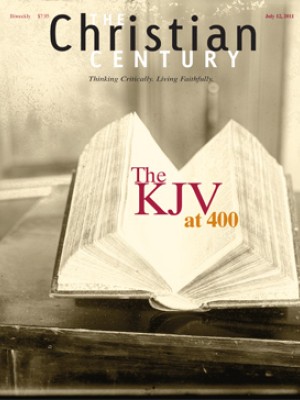Varieties of order
The Book of Order is part of my Presbyterian denomination's constitution. It includes rules, regulations and procedures for any situation that could happen in the life of our ecclesiastical family. We spend a fair amount of time amending, deleting, interpreting and rewriting the Order. Sometimes it gets in the way.
During a trip to Argentina I visited sister churches there and listened to stories about robust, growing and not very orderly Pentecostal churches. Then, in Buenos Aires, I received a phone call from a Pentecostal minister, the president of a theological seminary. Noting that my denomination has a deep historical commitment to theological education, he asked if I would meet with him and some of his colleagues. I said I'd be honored.
Read our latest issue or browse back issues.
All the participants had day jobs, so it was 9 p.m. when he picked up my companions and me at the hotel and drove through the city into a grimy working-class neighborhood, then down a dark alley to an automobile repair garage. He ushered us past the equipment and upstairs to a small room with two bare lightbulbs. Six men, all pastors and seminary professors, sat around a table. After introductions, I asked, "Where is the seminary?" With a sweep of his hand, the president pointed to a wall of shelves filled with cassette-recording equipment and tapes. "This is it. This is our seminary."
The cassettes were for brother pastors in rural Argentina who could not read or write. The pedagogical methodology was to record a Bible study and sermon on a cassette, then mail the cassettes to the rural pastors. The city pastors wondered if we had any advice or suggestions for them. All they had, they said, was the Spirit, but they had plenty of that.
I asked how many pastors they were trying to reach. We're not exactly sure, they answered. No one has ever counted them. "Surely you have some idea of how many there are," I persisted, thinking there were maybe a hundred or so.
"We think there are about 3,500," the president finally said. I was stunned. Over 3,000 pastors and no one counting them or their congregations—no rules, guidelines, processes or procedures, no structure, no accountability, no recognized authority, no academic credentials. Just 3,500 faithful Christians and the Holy Spirit. I was humbled.
I said I would refer their inquiry to my denomination's Office on Theological Education and mumbled something about adding a section of biblical studies, church history and theology to each weekly tape. In light of the work they were doing, I didn't have much to add other than my affirmation that they and the Holy Spirit seemed to be doing fine.
It was late. They knew that Americans loved pizza, so one of them had picked up a few pizzas and cans of Pepsi. After eating and drinking with my new friends, I returned to the hotel grateful for the orderliness of my tradition, but also grateful that the Spirit can use a variety of traditions, some orderly and some wonderfully disorderly, for the growth of the kingdom.






